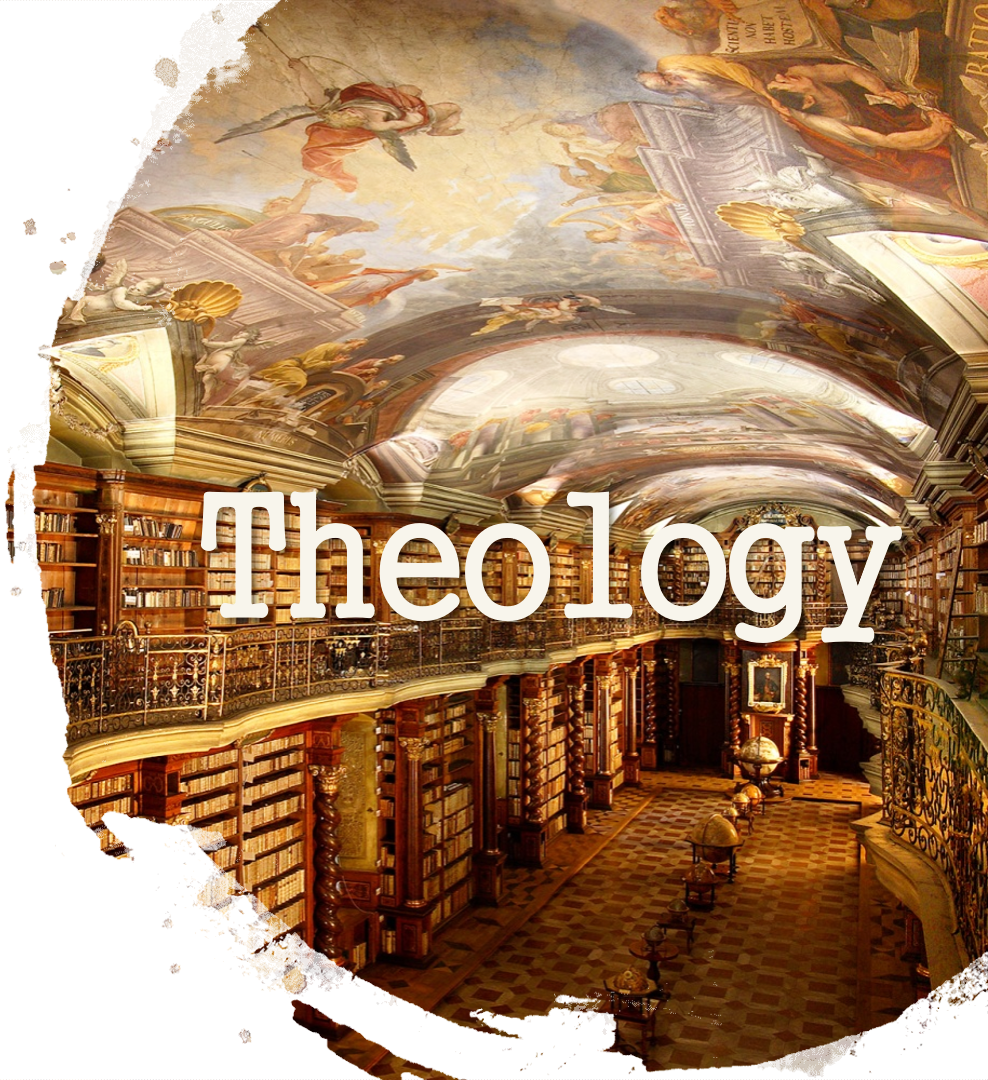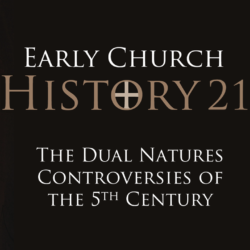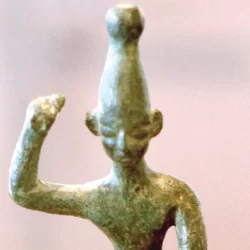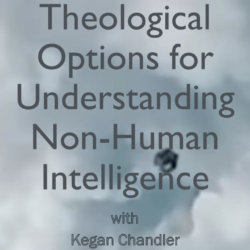Although later Christianity interpreted the handful of texts that call Jesus God as evidence that he shared the same rank, substance, and age as the Father, a more Hebrew-sensitive reading of these same verses yields more organic fruit. Instead of bringing in complex Greek philosophy to distinguish person from being and divine from human natures, the bible provides clear precedents for the idea that Jesus as God’s agent can be called God because he represents him. Thus, we do not have two Gods, but one God and his representatives, whether human judges, angelic beings, prophets, or the messiah himself. Suddenly centuries of harebrained distinctions and intellectual confusions dissipate like so much fog in the morning sun and we are left with Jesus of Nazareth, God’s man to announce and enact the good news. Texts discussed in this episode include Isaiah 9.6 (by Daniel Calcagno), Matthew 1.23, Psalm 82.1, 6, John 10.34ff, Psalm 45.6, Hebrews 1.8, Exodus 21.5-6, 22.8-9, John 20.28, and John 1.8. To follow along with this class, please download this handout as I refer to it repeatedly.
—— Notes ——
State the Doctrine Simply
Because Jesus is God’s supreme agent, people can call him “God” in the same sense that God called the judges “Gods” and Israelite kings could be called “God.” He is at once subordinate to God and he bears the divine authority and name as his representative.
Texts that Support This Teaching
Jn 5.19, 30; 8.28; 12.49-50; 14.10, 28; 1 Cor 11.3; 15.28
Difficult Texts
Although we worked through shaky texts last time where the bible might call Jesus God, now we want to work on the remaining key texts, including Hebrews 1.8, John 20.28, and John 1.18.
The word “God” is more flexible than you think.
Principle of Agency
angels prophets judges kings
Ex 3.3-6 Ex 4.14-16 Ex 21.5-6 Ps 45.1-7
Ex 20.1-3 Ex 7.1-2 Ex 22.8-9 Is 9.6
Psalm 8.5 Joel 3.16-17 Ps 82.1-8?
(Heb 2.7)
Isaiah 9.6 For a child will be born to us, a son will be given to us; And the government will rest on His shoulders; And His name will be called Wonderful Counselor, Mighty God, Eternal Father, Prince of Peace.
The Messiah is prophesied to be called “Mighty God” and “Eternal Father.” First of all, Trinitarians do not believe that Jesus is the Eternal Father; they believe he is the Eternal Son. So they too would argue that this name should not to be taken in a strict literal sense. Furthermore, there are many others who bore names that included the word God (Heb. El or Yah). Eliab means “My God Father”; Jehoram means “Yahweh Exalted”; Ithiel means “God with Me”; Isaiah means “Salvation of Yahweh.” Having a name doesn’t necessarily describe you it may describe your God. Also, it is possible to call a human being “God” if he represents God to the people. For example, Solomon (or whoever is in mind in Psalm 45) is called God (Ps 45.6-7). The judges of Israel are called Gods (Ps 82.6), a fact which Jesus played upon when he was accused of calling himself God (John 10.33-36). Jesus is called “Mighty God” because he represents the Mighty God. He is called “Eternal Father” because through him the Eternal Father discloses truth (John 14.10).
John 10.27-39
27 My sheep hear my voice, and I know them, and they follow me. 28 I give them eternal life, and they will never perish, and no one will snatch them out of my hand. 29 My Father, who has given them to me, is greater than all, and no one is able to snatch them out of the Father’s hand. 30 I and the Father are one.” 31 The Jews picked up stones again to stone him. 32 Jesus answered them, “I have shown you many good works from the Father; for which of them are you going to stone me?” 33 The Jews answered him, “It is not for a good work that we are going to stone you but for blasphemy, because you, being a man, make yourself God.” 34 Jesus answered them, “Is it not written in your Law, ‘I said, you are gods’? 35 If he called them gods to whom the word of God came– and Scripture cannot be broken– 36 do you say of him whom the Father consecrated and sent into the world, ‘You are blaspheming,’ because I said, ‘I am the Son of God’? 37 If I am not doing the works of my Father, then do not believe me; 38 but if I do them, even though you do not believe me, believe the works, that you may know and understand that the Father is in me and I am in the Father.” 39 Again they sought to arrest him, but he escaped from their hands.
Is Jesus countering the charge of blasphemy (Buzzard) or is he proving his deity (Heiser)?
contrast v31 with v39 to show that Jesus did defuse the situation with his citation of Psalm 82 and the subsequent explanation.
Jesus God’s Agent
Hebrew 1.8 (Your throne, Oh God…)
John 20.28 (My Lord and my God)
6 Interpretations for John 20.28
1 Polytheism: Was Thomas saying that in addition to the Father, the God of his childhood, he was now encountering another God? If the conversation had taken place in Rome or Ephesus and the participants were not Jews but Gentiles, this would be highly likely. However, as we noted above, Thomas was not a Gentile who grew up worshiping the household deity along with the city, country, and imperial gods. No, he grew up in a culture that had been cured of idolatry through the Babylonian exile, and which took great pains to never return to the idolatrous practices. Polytheism was not on Thomas’ mind here, nor should it been in ours.
2 Modalism: Was Thomas saying that now he had come to understand, by virtue of the resurrection, that Jesus was in fact the God of his Bible (the Old Testament)? Is Thomas the first “Jesus Only” believer? This possibility could work if we limited ourselves to just this text (John 20.28). However, we would still have major difficulties working this idea together with the typical Jewish notions about God that were around at the time. For example, the same Gospel, John, states, “No one has seen God at any time” (John 1.18), a thought that Paul echoes in his letter to Timothy when he says that the only God is invisible (1 Tim 1.17). In addition we find frequent statements throughout the New Testament that God was the Father of Jesus.[1] So, if we take the rest of the New Testament into account then this possibility is excluded as well.
3 Ontological: Did Thomas believe that Jesus was a co-equal, co-eternal member of the tri-personal God? Was he confessing that now he saw Jesus as an ontologically[2] divine person of God? Since this philosophical notion was completely foreign to the Hebrew thought world of the first century, it is not plausible that this is what Thomas had in mind. The idea that God is a community of multiple individuals had to wait for the highly trained Greek/Christian philosophers of the following centuries. To read fourth century trinitarian theology into this simple confession is anachronistic and mischievous.
4 Figurative: Nearly two weeks before, at the last supper, in response to a question that Thomas had asked, Jesus replied, “If you had known me, you would have known my Father also; from now on you know him, and have seen him” (John 14.7). Then, after Philip requested further clarification, Jesus said the following:
John 14.9-11
Have I been so long with you, and yet you have not come to know Me, Philip? He who has seen Me has seen the Father; how can you say, ‘Show us the Father ‘? 10 “Do you not believe that I am in the Father, and the Father is in Me? The words that I say to you I do not speak on My own initiative, but the Father abiding in Me does His works. 11 “Believe Me that I am in the Father and the Father is in Me; otherwise believe because of the works themselves.
Jesus was telling them that God was at work within him. By seeing Jesus this whole time, they were really seeing God in and through him both in word and in deed. Did they really believe this? To what degree did the disciples grasp this concept? Could it be that Thomas, the doubter, was skeptical even at this early moment, and that finally when he encountered the risen Jesus, he confessed that Jesus was his lord and now he knew that his God was in Christ? This possibility depends on breaking the phrase “my lord and my God” into two parts and applying the first to Jesus and the second to the God who was at work within Jesus. If this were the case, I imagine that Thomas would have looked Jesus in the eye while saying “my lord” and then changed his tone a bit and shifted his eyes to say “and my God” in a way that would be clear to all that he was not actually calling Jesus his God. This option, though plausible, lacks a certain convincing power due to the lack, in the text, of any indication that Thomas was not addressing both “my lord” and “my God” to Jesus. Surely John would have inserted a parenthetical explanation for clarification as he does in other places (i.e. John 2.21-22) if this were the case.
5 Political Subversion: According to Raymond Brown, Domitian, the Roman emperor at the time of the writing of John’s Gospel was called “Lord and God.”[3] Could it be that Thomas was juxtaposing Jesus for Caesar by calling Jesus his Lord and his God? Much research has been done, in particular on Paul’s writings, which has detected a good many expressions that would have been understood in an anti-imperial way. Still, there is no consensus among scholars that early first century Christianity actively opposed the imperial cult by applying Caesar titles to Jesus.[4] Even so, what has made much of this research plausible is the fact that Paul was writing to several major cities, not the least of which was Rome, in which the imperial cult was known to have been active. However, our question concerns Thomas, not Paul, and he is in Jerusalem, not Rome, in a private conversation with Jesus, not in a public letter to be read aloud. Could it be that Thomas was making an anti-imperial political confession here? Our answer is probably not—unless we take a more liberal approach to the Gospel of John. For example, if we believed that John was not actually trying to record the words of Thomas, but rather place words on Thomas’ lips, in order to communicate some religious truth to his community, then this explanation would immediately gain some traction. Since John was probably living in Ephesus at the time of the writing of this Gospel it is at least plausible to suggest that he would want to subvert the growing Caesar cult through this Thomas confession. Even still, if this were John’s agenda, would we not expect to find anti-imperial, subversive statements throughout his Gospel? So from both conservative and liberal approaches this interpretation is not too appealing.
6 Representational: Was Thomas confessing that Jesus was not only his lord but also the authorized representative of God on earth—the one destined to rule the world on God’s behalf? Jesus had been crucified for claiming to be God’s Messiah. His death proved to everyone that he was in fact, a false Messiah. One can scarcely imagine the depths of despair to which the disciples were driven during the days immediately following Jesus’ crucifixion. One can just imagine the sorts of thoughts that were clashing within their minds. On the one hand they would be trying to come to terms with the fact that he was dead. They might have thought, “Somehow, we have been deceived…Jesus is not the Messiah…he is dead…not only is he dead but he was publicly executed by the State for claiming to be the Messiah…he was publicly discredited in the most humiliating way imaginable…and to make everything worse, the Torah says that he is under God’s curse because ‘cursed is everyone that hangs on a tree.’” But then another whole set of thoughts would rush in: “but he healed the sick…he cast out demon after demon…he was righteous…to think that he was pulling off a great deception is impossible…he was attested by God with miracles…he told the storm to be quiet…he raised Lazarus from the dead…he must be the Messiah.” We can imagine how these two groups of thoughts would wage war in the minds of the disciples. They were confused; they were at a loss to understand how this could have happened–how Jesus could have been crucified. This experience of cognitive dissonance was extenuated for Thomas because he was the last one to see Jesus. He would not allow himself to believe that Jesus was resurrected even though the women, Peter, the two who were on their way to Emmaus, and even the other eleven had all told him that they had seen him alive. Thomas probably felt that he needed to protect himself by not getting his hopes up (like he had done before) so they wouldn’t be dashed to pieces again. But, what must it have been like when Thomas finally saw Jesus? Suddenly, in his astonishment, the one last obstacle to faith removed, Thomas came to believe that Jesus was indeed resurrected. But what did that mean to him?
What we encounter in John 20.28 is not careful, theological reflection on the event, but a knee-jerk response. Thomas was confessing something he had been denying for the last dozen or so days. Jesus was in fact who he claimed to be: the Davidic king, the Messiah, the holy one of God, God’s Son, and the supreme representative of God. The sign that had been hung above his head on the cross, which was meant to be a sarcastic absurdity, was now doubly ironic because in that gruesome event the people really were witnessing the crucifixion of God’s Messiah! Now at last, all doubts were assuaged and Thomas saw and came to believe exactly what John’s intended purpose was for writing his Gospel—that Jesus is the Messiah, the Son of God—and that is what is conveyed when Thomas said, “my Lord and my God.” Thomas called Jesus “my God” in a representational sense.
John 1.18 [ESV]
18 No one has ever seen God; the only God, who is at the Father’s side, he has made him known.
John 1.18 [HCSB]
18 No one has ever seen God. The One and Only Son–the One who is at the Father’s side–He has revealed Him.”
J.A.T. Robinson:
“It would however be precarious to rest any answer on the quotation of John 1.18, that ‘the only one, himself God, the nearest to the Father’s heart, has made him known’ (NEB margin). For there is a notorious textual crux at this point. From the manuscript evidence there is every reason to believe that monogeh.j qeo,j is the reading that reaches furthest back to source, and every modern edition of the Greek Testament properly gives it precedence. It is equally noticeable however that both the RSV and the NEB still prefer o` monogeh.j ui`o,j in their text, as opposed to the margin, and I am inclined to judge that they are right. For the contrast with ‘the Father’ appears overwhelmingly to demand ‘the only Son’ (as in 1.14), and monogeh.j qeo,j is literally untranslatable (‘the only one, himself God’ is a paraphrase to make the best of it) and out of line with Johannine usage (contrast 5.44 and 17.3 of the Father). …But nothing should be made to turn or rest on this, one way or the other.”[5]
Bart D. Ehrman:
“…[T]he majority of manuscripts are right in ending the prologue with the words: “No one has seen God at any time, but the unique Son (o` monogenh.j ui`o,j) who is in the bosom of the Father, that one has made him known.” The variant reading of the Alexandrian tradition, which substitutes “God” for “Son,” represents an orthodox corruption of the text in which the complete deity of Christ is affirmed: “the unique God [(o`) monogenh.j qeo,j] who is in the bosom of the Father, that one has made him known.”…”
It must be acknowledged at the outset that the Alexandrian reading is more commonly preferred by textual critics, in no small measure because of its external support. Not only is it the reading of the great Alexandrian uncials (a B C), it is also attested by the earliest available witnesses, the Bodmer papyri î66 and î 75, discovered in the middle of the present [20th] century…
Here it must be emphasized at that outside of the Alexandrian tradition, the reading monogenh.j qeo,j has not fared well at all. Virtually every other representative of every other textual grouping—Western, Caesarean, Byzantine—attests o` monogenh.j ui`o,j. And the reading even occurs in several of the secondary Alexandrian witnesses (e.g., C3 Y 892 1241 Ath Alex). This is not simply a case of one reading supported by the earliest and best manuscripts and another supported by late and inferior ones, but of one reading found almost exclusively in the Alexandrian tradition and another found sporadically there and virtually everywhere else. And although the witnesses supporting o` monogenh.j ui`o,j cannot individually match the antiquity of the Alexandrian papyri, there can be little doubt that this reading must also be dated at least to the time of their production. There is virtually no other way to explain its predominance in the Greek, Latin, and Syriac traditions, not to mention its occurrence in fathers such as Irenaeus, Clement, and Tertullian, who were writing before our earliest surviving manuscripts were produced. Thus, both readings are ancient; one is fairly localized, the other is almost ubiquitous…
It is on internal grounds that the real superiority of o` monogenh.j ui`o,j shines forth. Not only does it conform with established Johannine usage, a point its opponents readily concede, but the Alexandrian variant, although perfectly amenable to scribes for theological reasons, is virtually impossible to understand within a Johannine context.”[6]
Timothy Paul Jones:
“It’s possible that the same sort of change occurred in John 1.18. This verse may have originally described Jesus as “the one and only Son.” Or the text might have read “the one and only God”—the manuscript witnesses to these two readings are, in my opinion, evenly divided.”[7]
So this is a verse which could go either way. If, in fact, the better reading is “the only begotten God” then this would be simply another instance where Jesus is called God in a representational sense. If the better reading is “the only begotten Son” then this also fits very well with the notion that Jesus is the human Son of God, divinely begotten in the womb of the virgin Mary (cf. Luke 1; Matthew 1).
There are two manuscript traditions here. One says “only begotten Son” and the other “only begotten God.” Scholars debate which is correct, with many of the textual critics agreeing that since the earliest manuscripts contain “only begotten God,” and it is more likely that a scribe would change this difficult phrase to the more natural “only begotten Son” than the other way around, the original was “only begotten God.” If this is true, then this would be another instance where Jesus is called God because he represents God as the word made flesh (see John 20.28 for more on this).
Meanwhile others are unconvinced that this local tradition is correct because the manuscripts containing “only begotten God” are only found in the Alexandrian (Egypt) area, while the others reading “only begotten Son” are found in the Western, Caesarean, and Byzantine traditions. Furthermore, the phrase “only begotten God” is foreign to the language of the Gospel of John and directly contradicts John 17.3 which indicates that the only true God is the Father. It is possible that the “only begotten God” reading, though primitive, is not actually what John wrote, but instead an early corruption used to bolster the prologue of John to teach that Jesus was actually God. Versions that use “only begotten Son” include NJB, NKJV, KJV, YLT whereas nearly every modern translation has “God” instead of “Son” because the manuscript evidence for “God” is earlier.
[1] Rom. 1.7; 15.6; 1Cor. 1.3; 8.6; 2 Cor. 1.2-3; 11.31; Gal. 1.3; Eph. 1.2-3, 17; 5.20; 6.23; Php. 1.2; 2.11; Col. 1.3; 3.17; 1 The. 1.1, 3; 3.11, 13; 2 The. 1.1-2; 2 The. 2.16; 1 Tim. 1.2; 2 Tim. 1.2; Phm. 1.3
[2] Ontology has to do with one’s being or substance. Classic trinitarianism teaches that the Son is of the same substance as the Father. He is ontologically God, as opposed to what we are saying here, that Jesus is God in a representational sense.
[3] Raymond E. Brown, An Introduction to New Testament Christology, (New York: Paulist Press, 1994), p 189.
[4] cp. the recent debate between N.T. Wright and John Barclay at SBL (2007).
[5] Robinson, The Priority of John, pp. 372-373.
[6] Bart D. Ehrman, The Orthodox Corruption of Scripture, (New York: Oxford University Press, 1993), pp. 78-79.
[7] Timothy Paul Jones, Misquoting Truth: A Guide to the Fallacies of Bart Ehrman’s Misquoting Jesus, (Downers Grove, IL: InterVarsity Press, 2007), p. 57-58.
—— Links ——
- For the handout see Explanations to Verses Commonly Used to Teach that Jesus Is God
- See other episodes in this Theology Class
- Find more Restitutio classes here
- Intro music: Jazzy Frenchy by bensound.com. Licensed under Creative Commons: By Attribution 3.0 License.








I myself see Messiah as the Shaliach of God, but none the less I struggle with certain texts and I was hoping that you would share with me your understanding/insights regarding these verses.
In John 1:1 it reads:
“The word was in the beginning, and that very word was with God, and God was that word (or as most translations read; the word was God; literally “And what God was the word was”).” Then in verse 14 it says that this word became flesh and tabernacled/dwelled among us, and we saw it’s glory like that of the firstborn of the Father. Probably based upon Revelation 19:13 one concludes that this is about the Messiah. Revelation 3:14 also seems to talks about Yeshua as ‘the beginning of G-ds creation’; it doesn’t say ‘the first of creation’. Thus it could refer to what John is talking about when he says: “He was in the beginning with G-d. All things were made through him, and without him nothing was made that was made”. Then there are also verses like Colossians 1 (especially verse 15 and 19), 2:9, and Philippians 2 (verses 6-11). And what to think of Psalm 48:7 which seems to indicate no ‘man’ can by any means redeem his brother, nor give to God a ransom for him (i.e. one’s life/soul).
So based upon these verses a lot of people conclude that God Himself came or presented Himself to us in the form of Messiah.
Revelation 1:8 reads something like this: “I am the Alef and the Tav”, says the Lord God (probably a translation of YHVH Elohim) Who is, Who was and Who is to come, the Almighty.
It seems that God is the one Who utters these words.
Then in Revelation 1:17 it says something like: “Fear not, I am the First and the Last”. Because it says in verse 18 that he is the living (one) who was dead, and earlier in verse 13 it says that one of the light bearers (menorahs) was like the son of man, it seems that Yeshua utters these words (that seems to be confirmed by Revelation 2:18 “These things saith the Son of God).
Revelation 2:8 reads: “These things saith the First and the Last, who was dead and liveth.” again this seems to be Yeshua who utters these words.
Then in Revelation 21:6 it says: “I am the Alef and the Tav, the Beginning and the End/Start and Completion.” Because of the words in verse 17: “I will be his God, and he shall be My Son” I assume it’s God who utters these words.
And the last verse I would like to quote is from Revelation 22:13: I am the Alef and the Tav, the Beginning and the End, the First and Last. Because of the words in verse 16: “I Yeshua have sent my messenger* to testify to you these things in front of the communities of faith.” I assume it’s Yeshua who utters these words.
* this reminded me of Revelation 22:6 where it says that God is sending his messenger to show His servants the things which must occur.
Now here’s another question: How can Yeshua utter the exact same words as God, if he is not God Himself but a shaliach (emmissary)?
From the perspective that Messiah is God’s Shaliach (Emmisary/Agent) how should one understand such verses?
And although I think Yeshua most certainly fulfilled a role of a Shaliach, why does this have to mean that he can’t be G-d and if he isn’t G-d then what is his ‘nature’?
I would appreciate it if you could show from scriptures and context how to interpret these verses, and help me out, I would like to thank you in advance for all the help, time and effort.
With great regards,
Noah